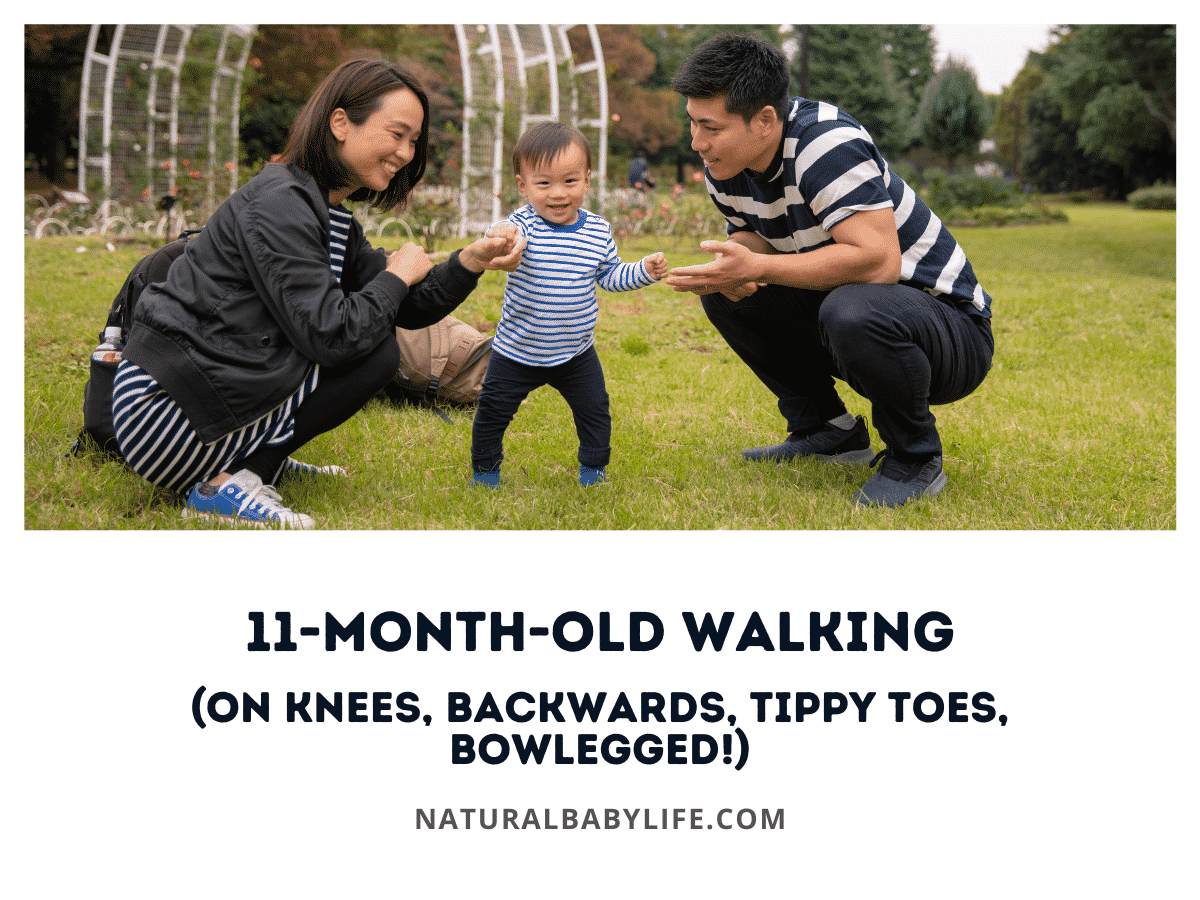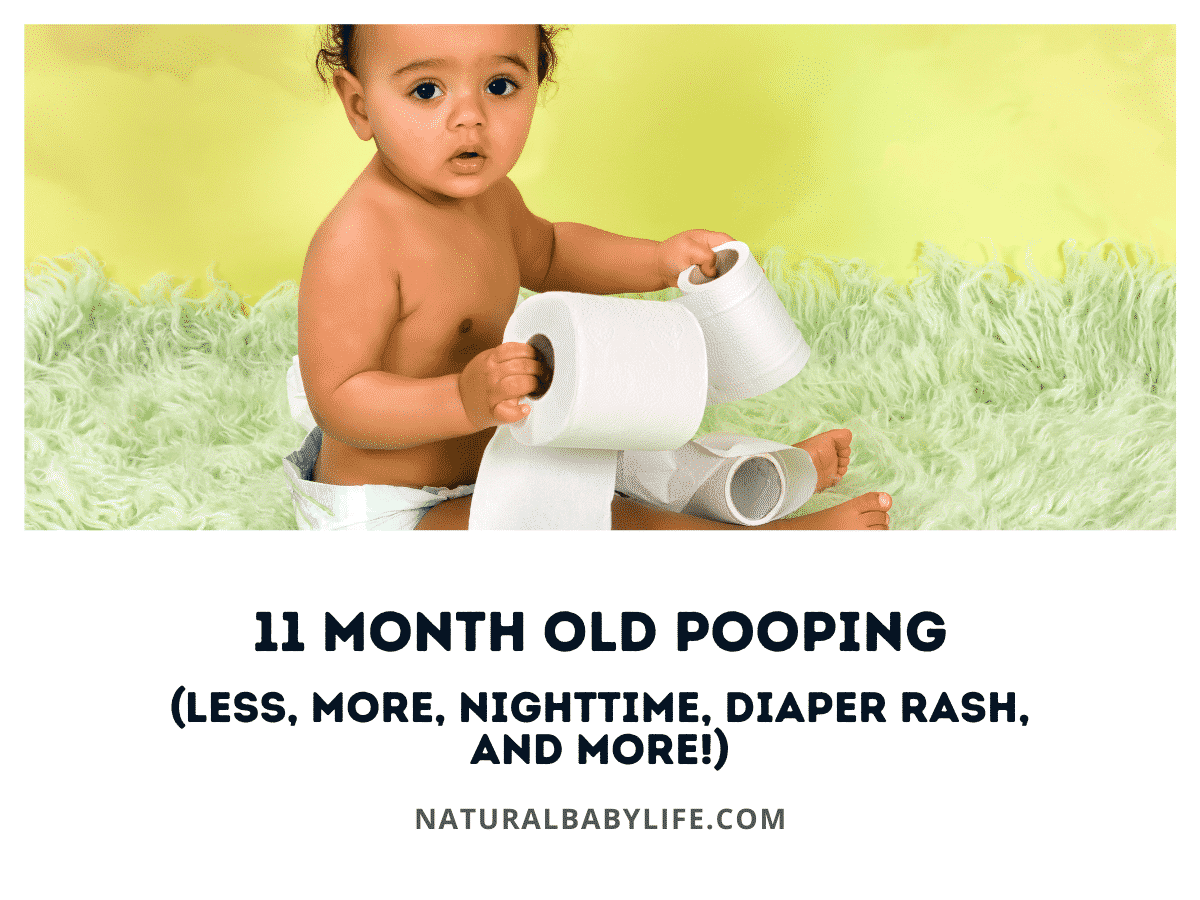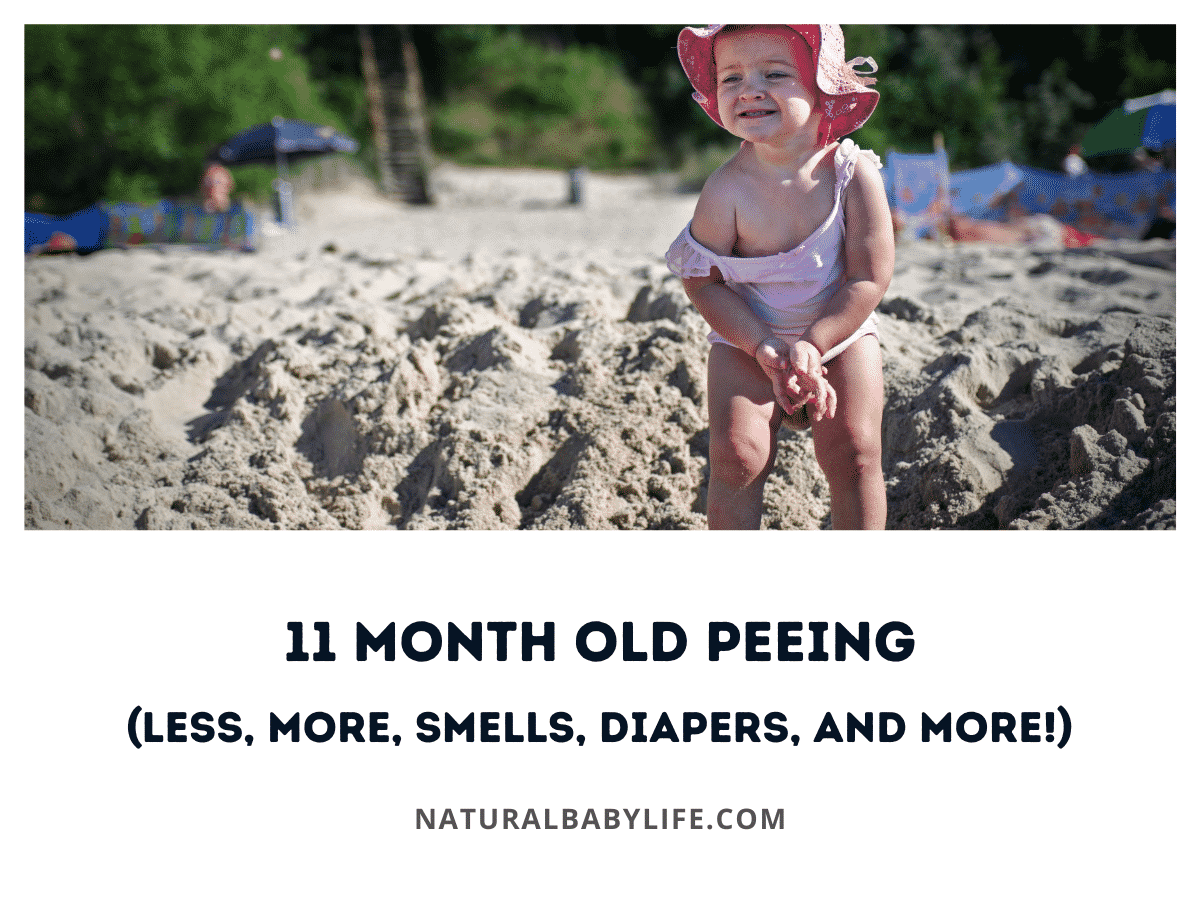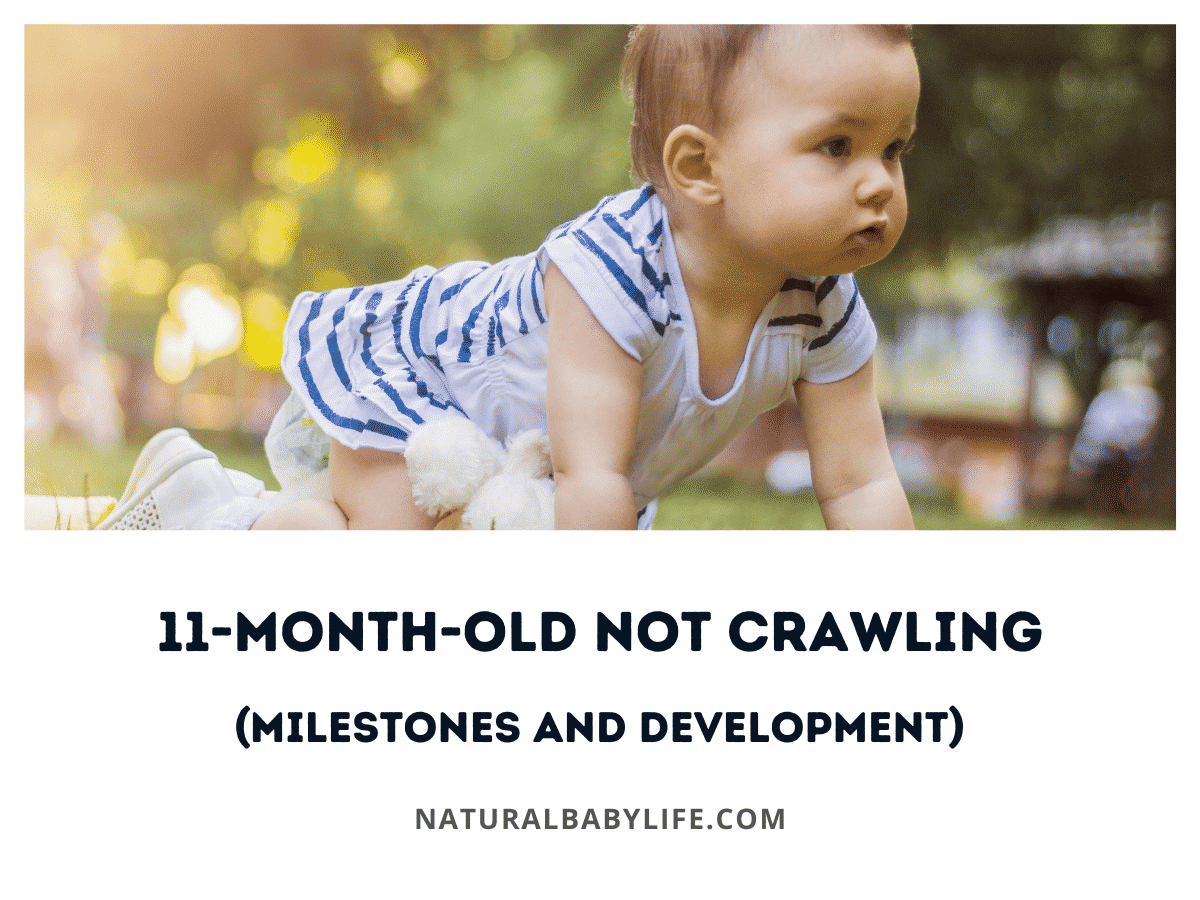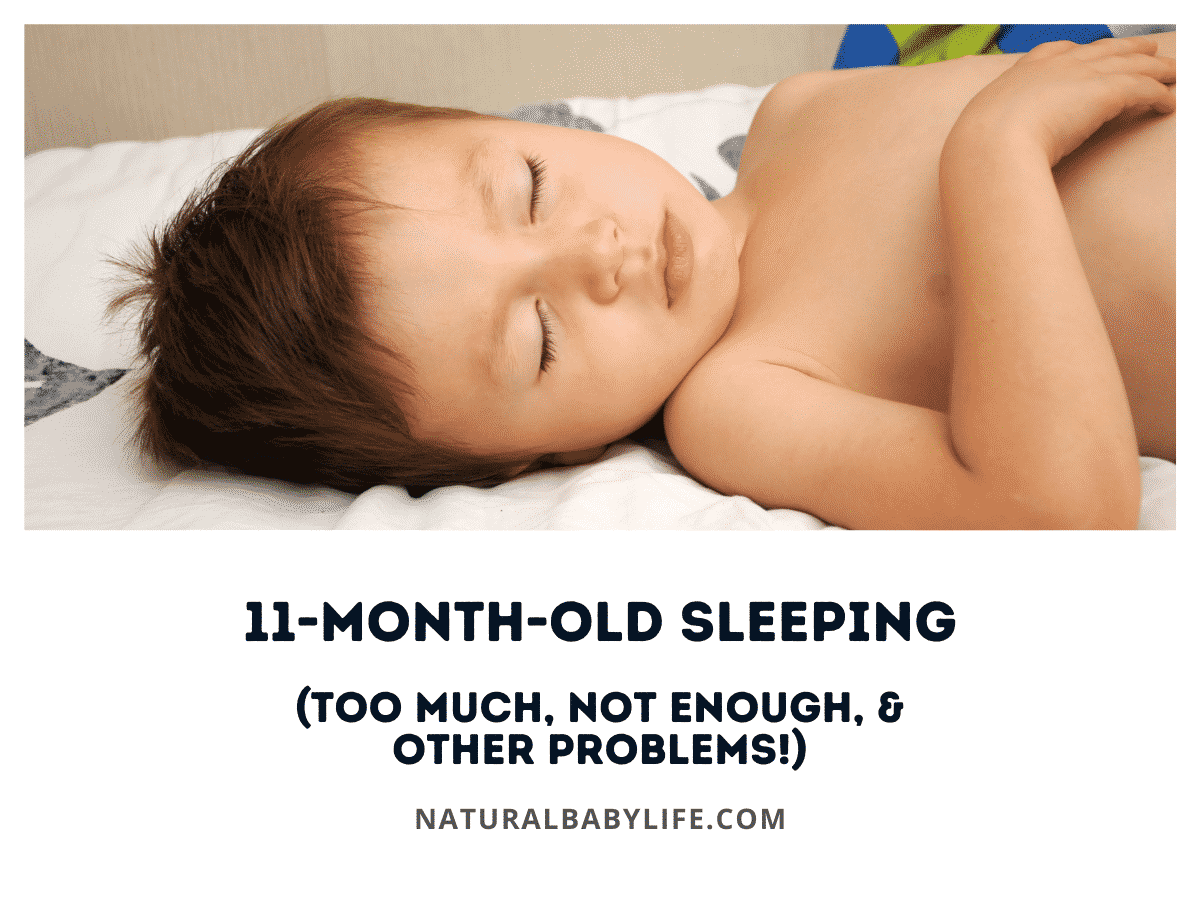Walking is a huge milestone in your baby’s life, and, at eleven months, it could happen any day! As with any milestone, practicing this skill takes time and he can start moving around in a variety of ways which include being on his knees or tippy toes or having bowed legs in the beginning! Which begs the question, what is normal new walker behavior?
At 11 months, your baby is either walking or mastering the skills needed to start taking their first few steps unassisted. Because your baby is trying to master a complex new skill, some babies might walk on their knees, walk backward, go up on tippy-toes, or seem bowlegged. All of these are normal, as long as the baby is developing and mobile.
Read along as we discuss all the ins and outs of your 11-month-old baby when it comes to walking.
Table of Contents
Can babies walk at 11 months?
Your baby’s first steps are important and exciting!
Babies typically start walking from 8 months to 18 months, and around 11 months is a prime time for babies to either start or master the skill of walking. It is important to know that each baby will have different timelines and some babies walk early or late.
Remember when your baby was just a few months old and practicing rolling over – then comes the phase when he is crawling, sitting unassisted, and pulling up on furniture. All these milestones are important because it prepares your baby for the biggest one yet which is walking.
The different skills that your baby needs to master before taking his first step include coordination, balance, and having one leg support their full body weight. Each of these skills builds upon each other and will result in a baby taking their first steps and fully walking.
Each baby will have its timeframe which is sometimes not by the book. If your baby is still not mobile at 18 months, you can address any concerns with your doctor.
What milestones should your 11-month-old be doing?
At 11 months, your baby is just a few months shy of being a toddler which means that there are plenty of milestones and changes that he is going through at this time.
Most of these important milestones are involved with walking, eating solid foods, and other cognitive and physical milestones like clapping hands together and talking.
Your baby might be walking or getting ready to take his first few steps. Language is also developing rapidly at this stage with your baby learning more words or blabbing more. You should encourage your baby’s language skills by keeping conversations and reading to your baby frequently.
Here are some of the other milestones that your 11-month-old will go through:
- Sleeping – At this age, sleep is still king with your baby clocking in 11 hours at night and two naps during the day averaging from one to two hours. Some babies can sleep through the night at this age.
- Eating – Most babies are taking in more solid food at this age. To encourage a balanced meal, your baby should have ¼ to ½ cups of grains, fruit, and veggies, ¼ to ½ cup of dairy foods, and ¼ to ½ cup of protein each day. Babies who are still breastfeeding typically consume 16 to 24 oz of breastmilk or formula.
- Encourage mobility – Your baby is probably learning to cruise or move around the house by holding on to different pieces of furniture. Some babies are full-on walking. Pull and push toys and baby walkers are great toys that your baby can play with that can help him with developing the skills needed to walk
- Other development – Your baby will be able to clap, wave goodbye, raise a cup to drink, and bang toys together. Blocks, shape sorters, activity toys, and musical toys are great tools that your baby can play with to help with fine motor skills as well as cognitive skills.
What if your 11-month old isn’t interested in walking?
Every baby has his own timeline when it comes to big milestone developments and this includes walking. But what should you do if your 11-month-old is not showing any interest in walking?
A baby at 11 months who is not showing any interest in walking might be concerning but it is completely normal!
Even though your baby is uninterested in walking, you should keep in mind that, at 11 months old, your baby is trying to master other skills like sitting up unassisted, pulling up on furniture, or standing alone. All these skills are signs that your baby will start walking soon.
The best thing that you can do is to encourage these skills by putting your baby in a baby walker or showing him how to use push and pull toys.
If your baby is born prematurely, he might begin walking later than other babies his age. This is because premature babies are born earlier and you should always use their adjusted age when it comes to gauging your baby’s development. The adjusted age is based on your baby’s original due date.
Here are some things that you can do to help your 11-month-old baby develop an interest in walking:
- Hold your baby’s hands in a standing-up position and slowly guide your baby across the floor. This exercise helps their leg muscles to become stronger, teaches them to lift their legs, and improves balance.
- You can also encourage floor play by sitting on the floor with your baby and playing with different toys. Your baby will use this time to master crawling or being mobile on the floor which is a needed skill when he is starting to walk.
- Babyproofing your home is also important when you are encouraging your baby’s mobility. Make sure that your floor is free of objects that can trip up your baby. If you have stairs, you have to install baby gates to prevent your baby from falling.
If your baby is still not showing signs of any mobility at 18 months, you should most definitely talk to your doctor to eliminate any possible underlying issues.
Should 11-month-olds walk in shoes?
There is nothing cuter than a baby wearing those cute itty-bitty shoes but when it comes to putting shoes on your new walker, it is not a requirement.
It is safer for your baby to walk on his bare feet because this helps all the muscles in his legs and feet develop. Shoes are not required especially if your baby is indoors. Walking barefoot can also improve your baby’s balance and coordination.
If your baby is walking indoors and it is cold, you dress him in non-slip socks to prevent his feet from getting cold and to prevent slipping. You can put shoes on your baby if he is walking outdoors to protect his feet.
Common issues with 11-month-old walking babies
Because your baby is a new walker, this is one skill that he will continue to master.
Your baby might start off walking in unusual ways, and there is nothing wrong with this because he is just learning. Common ways your baby may learn to walk include:
- On tippy toes
- On knees
- With one foot turned out
- Bowlegged
- Backward
- Sideways
- Dragging one foot
11-month-old walking on tippy toes
According to the Mayo Clinic, walking on tippy toes or toe walking is normal especially with children who are just learning how to walk. Most children outgrow this.
Walking on tippy toes is not a concerning thing, as long as your child is developing normally and growing.
However, if your child is walking on his tippy toes past age 2, you should make an appointment with your doctor to eliminate any underlying causes. Some causes include tightness in the leg muscles or lack of muscle coordination.
11-month-old walking on knees
Some 11-month old babies are walking on their knees and this is also very common and is considered a normal part of development.
Walking on knees helps improve your baby’s balance and this might be caused by their leg muscles not having enough strength to hold up the baby’s weight.
Once your baby’s leg muscles get more exercise, the balance will shift from the knees to the leg which can help them stay upright. As long as your baby is developing well and is mobile, there should be no cause for concern.
11-month-old walking with one foot turned out
Some 11-month-old babies walk with one foot turned out which is also known as out-toeing. This occurs when the foot is externally rotated.
This occurrence is fairly common especially in the first few months of your baby’s life. Many will outgrow this as your baby’s leg muscles straighten and the bones become stronger. This is not normally a cause of concern but you can mention it to your pediatrician.
Out-toeing can lead to pain and disability growing up and can occur in different areas of the body which include feet, hips, and legs.
11-month-old walking bowlegged
Bowlegs occur when the baby’s legs are curved outward at the knees. This is considered a normal part of the growth in babies and toddlers, especially if they are mastering the art of walking. This condition is not painful or uncomfortable.
If your baby is walking bowlegged, it might look uncomfortable but this condition does not interfere with your baby’s ability to walk, run or play.
Toddlers usually outflow this between 18-24 months of age. In very rare cases, bow-leggedness can be a sign of a growth disorder. Talk to your doctor if you are concerned about this and your baby’s legs are not correcting by themselves.
11-month-old walking backward
Babies walking backward might look awkward but it is a sign of great development.
Walking backward means that your baby has mastered the use of their legs to counterbalance a fall and give them spatial awareness which helps them maneuver their body backward without bumping into any objects.
Walking backward is completely normal and can help strengthen your baby’s leg muscles and improve balance and coordination. Because of this, walking backward is not a cause of concern.
11-month-old walking sideways
Walking sideways is also a normal part of learning how to walk because this means that your 11-month-old baby is trying to become mobile while getting used to the different ways that he can walk.
If your baby is walking sideways by holding on to furniture, it is only a matter of time when he can learn to let go and start taking steps on his own.
11-month-old drags foot when walking
Your 11-month-old might be trying to walk but you notice that he is dragging one foot while walking.
This occurrence also known as a foot drop is a common condition that might potentially indicate an underlying muscle problem.
If your baby is just learning to walk and you notice him dragging his feet, you can monitor if this goes away on its own. If it doesn’t, you should consult your doctor.

